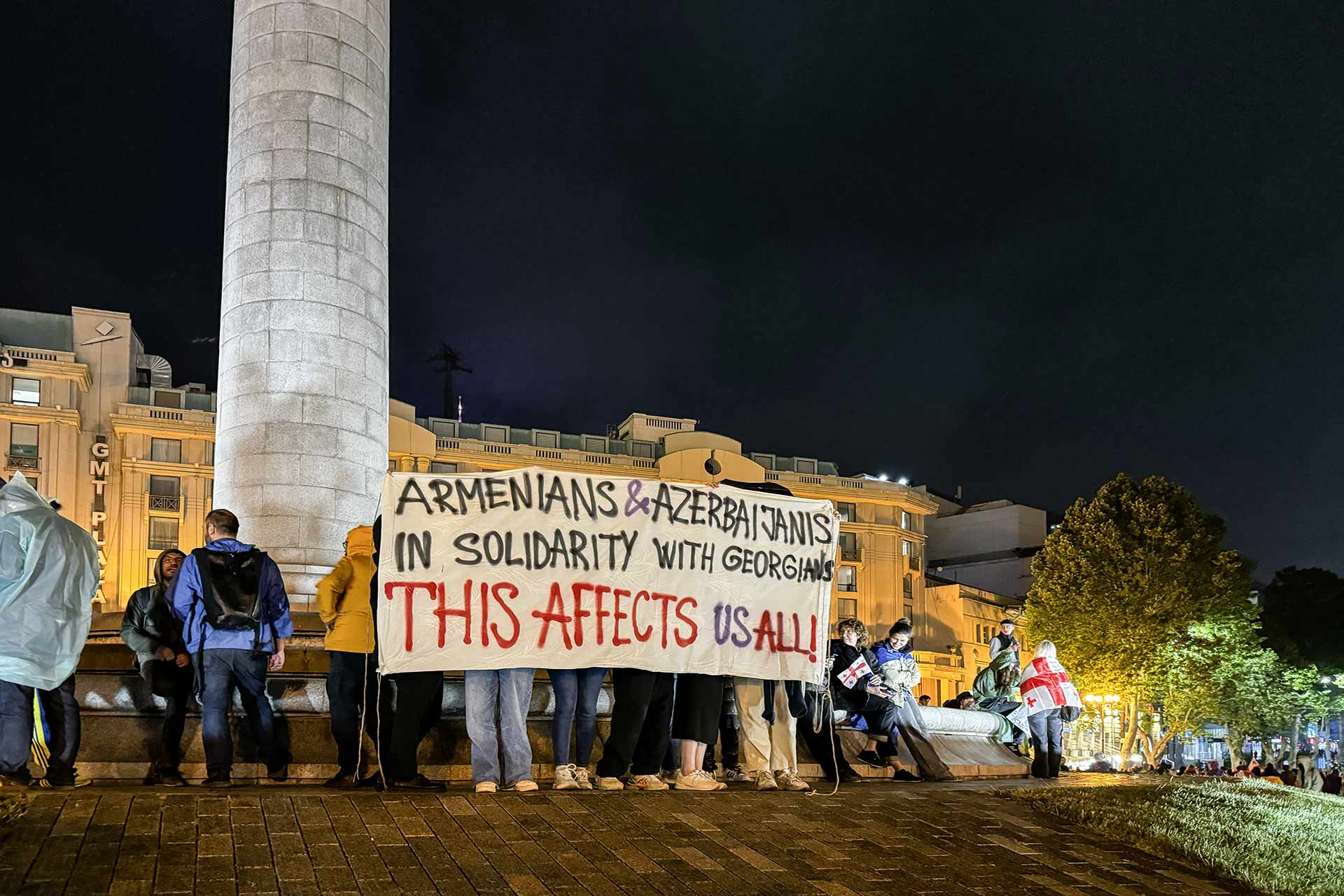After weeks of arguments and protests, the Georgian Parliament overturned the presidential veto and adopted the disputed law on foreign influence on Tuesday, pushing the country away from the European Union.
The ruling Georgian Dream party achieved this in spite of the vigorous resistance in parliament and on the street. The process involved fistfights between lawmakers, quick voting before security would allow opposition lawmakers to enter the room and campaigns to silence opponents.
 Opposition Parliamentarian punches ruling party MP before announcement of Foreign Agent draft bill. (Photo: Youtube screenshot by პირველი არხი Georgian Public Broadcaster)
Opposition Parliamentarian punches ruling party MP before announcement of Foreign Agent draft bill. (Photo: Youtube screenshot by პირველი არხი Georgian Public Broadcaster)
The lead-up to the law also featured a campaign of harassment against journalists and civil society advocates. They found posters on the walls in their neighborhoods displaying their faces with the labels “foreign agent” or “traitor” underneath and received a spate of threatening phone calls.
When Edo Javakhidze answered a call from an unfamiliar number about 10 days ago, he faced an avalanche of curses over his resistance to the new Georgian “foreign agent” law. He and like-minded Georgians believe the law will push the country into a Russian-like autocracy.
The string of vulgar words was followed by threats typical of an angry individual, but when the caller mentioned Javakhidze’s late father’s name, cursing him for raising such a son, and then the names of several relatives, Javakhidze was convinced the caller had access to personal data that only a government agency would possess.
One more detail: The caller used his real name, Eldar, the one in his documents. For years, nobody called him that; everyone who knows him calls him Edo.
The government was behind these calls, the Secretary of the opposition party United National Movement’s Civil Integration concluded.
Georgia’s interior ministry never replied to OCCRP’s request for comment.
Javakhidze is just one of dozens of protesters, activists, and journalists who received such chilling calls meant to silence opposition to the law and the protests that followed its adoption every step of the way.
OCCRP reporters collected the numbers from the victims’ phone lists and called back to check who was behind the intimidation campaign. They had to dial phones in Georgia, Ukraine, Azerbaijan, Turkey, and even Singapore.
Most of the time, they received “non-existent number” replies or reached confused citizens who did not know what the reporters were talking about or simply hung up.
“I bought this number two days ago…. No, I have nothing to do with things like that. I am a person who never leaves the house,” one Azeri woman told OCCRP in a trembling voice.
Caller ID Spoofing
The Personal Data Protection Service, a state agency, announced several days ago that it was handing over the case of threatening phone calls to the Prosecutor's Office after concluding their on-site inspection with three Georgian operators.
“It was revealed that the named cases represent Caller ID Spoofing,” the agency said, explaining that the telecom companies had no control over those calls. The agency said it was handing it over to the prosecution because the calls were “threatening and offensive, aimed at trying to intimidate citizens.”
Caller ID spoofing is when a caller deliberately falsifies the information transmitted to the receiver’s caller ID display to disguise his identity. When the phone rings, the display shows a completely different number than the one the caller is really using. This can be done thanks to spoofing applications that are available for free in the Google Play store.
Then there were the calls that appeared to have come from Azerbaijan. More than a dozen of those had the numbers “005”, “004” or “006” after the country code, and once reporters called back, the call would not get through.
Other numbers turned out to belong to average Azeris who had no clue and were surprised. They all used Azerbaijan’s largest corporate telecommunication service, Bakcell.
Bakcell told OCCRP that it had conducted an investigation together with Georgian operators and also found the calls had been made via a “fraudulent method” called CLI Spoofing, which they have no control over.
This could be how the number of 84-year-old Kapitolina Sergeyevna from Azerbaijan ended up “calling” Georgian activist Nina Tugushi on May 11.
“I swear it was not me,” the old woman said, explaining that she had been receiving weird calls, one from a lady who spoke in Georgian. “I said I didn't understand, then she hung up on me. They called from different numbers… One person said to me that they received a call from me, but I said that is not possible,” she told OCCRP.
‘Foreign Agents’
The calls started after mass protests against the controversial Law on Transparency of Foreign Influence, which deeply divided the country in April when it passed through the first hearing in the Georgian Parliament.
After parliament adopted it, the bill was vetoed by the president, but that veto was overturned by parliament on Tuesday.
When it comes into effect, the law will mandate that non-governmental organizations and independent media outlets receiving funds from abroad register as agents of foreign influence, "pursuing the interests of a foreign power," which subjects them to government scrutiny. A similar law has nearly killed civil society in Russia.
During the process in parliament and the mass protests on the streets, the phones kept ringing.
 Protesters holding banner showing support to Georgians in Tblisi, Georgia. (Photo: Aidan Iusubova/iFact)
Protesters holding banner showing support to Georgians in Tblisi, Georgia. (Photo: Aidan Iusubova/iFact)
“The first calls came from Ukraine, then Singapore. If I am not mistaken, there were also Azerbaijani numbers; the rest were Georgian numbers,” Davit Bragvadze, a lecturer at one of the private universities, told OCCRP.
The same evening, Davit’s wife also started receiving the same type of calls, insulting her. Then a call was made to his mother.
Another protest participant, Salome Chkhaidze, told OCCRP that receiving a call from Azerbaijan was strange for her, as the person spoke in Georgian, but once she called back, the operator spoke in Russian and then the call got disconnected.
“This was a terror,” Edo Javakhidze said about the campaign. “The fact that these callers had the phone numbers of my family members means they have all the information about me, and these calls were supported by the government.”



